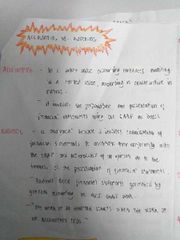![]()
![]()
![]()
Use LEFT and RIGHT arrow keys to navigate between flashcards;
Use UP and DOWN arrow keys to flip the card;
H to show hint;
A reads text to speech;
42 Cards in this Set
- Front
- Back
|
Examples of Accounting Principles |
1. COST PRINCIPLE 2. LIABILITY RECOGNITION PRINCIPLE 3. INCOME RECOGNITION PRINCIPLE 4. MATCHING PRINCIPLE 5. ACCRUAL |
|
|
Requires that assets should be recorded initially at original acquisition cost |
COST PRINCIPLE |
|
|
It is recognized when it is probable that an outflow of resources embodying economic benefits will be required for the settlement of a present obligation and the amount of the obligation can be measured reliably |
LIABILITY RECOGNITION PRINCIPLE |
|
|
The settlement of the obligation requires payment of cash, other assets or services |
LIABILITY RECOGNITION PRINCIPLE |
|
|
Income should be recognized when earned rather than when cash is received |
INCOME RECOGNITION PRINCIPLE |
|
|
All cost and expenses incurred in earning revenue should be reported in the same time |
MATCHING PRINCIPLE |
|
|
Means that income is recognized when earned regardless of when received and expense is recognized when incurred regardless of when paid |
ACCRUAL |
|
|
The timing of receipts and payment of cash is not the basis for the recording of income and expenses |
ACCRUAL |
|
|
The timing of the earning process of income and the incurrence of expenses are considered |
ACCRUAL |
|
|
Authorized by law to promulgate rules and regulations affecting the practice of the accountancy professions in the Philippines |
BOARD OF ACCOUNTANCY |
|
|
They are responsible for the preparation and grading of CPA exam |
BOARD OF ACCOUNTANCY |
|
|
Generally CPAs practice their profession in three main areas |
PUBLIC ACCOUNTING PRIVATE ACCOUNTING GOVERNMENT ACCOUNTING |
|
|
Employed by a particular business firm or not for profit organizations |
PRIVATE ACCOUNTING |
|
|
Those that render services to the government |
GOVERNMENT ACCOUNTING |
|
|
An international examination that is given to financial managers, executives, or analyst who have atleast three years of managerial of supervisory experience |
CERTIFIED MANAGEMENT ACCOUNTANTS EXAMINATIONS |
|
|
Designed to equip student with all necesary technical skills and basic knowledge required to fulfill a support role in accountancy and necessary skill at a technician level |
CERTIFIED ACCOUNTING TECHINICIAN |
|
|
Exams now administered in the Philippines for qualified graduates after a review conducted by accredited orgs in the Philippines |
INTERNATIONAL BOOKKEEPER AND CERTIFIED COST ACCOUNTANT EXAMS |
|
|
Concerned with the recording of transactions for an economic unit and the periodic preparation of reports |
GENERAL OR FINANCIAL ACCOUNTING |
|
|
Examination of financial statement for the purpose of expressing an opinion as to the fairness with which the FS is prepared An independent review of the accounting records
|
AUDITING |
|
|
Has no precise coverage but is generally refer to services to clients on other phases of business operation |
MANAGEMENT ADVISORY SERVICES OR MANAGEMENT ACCOUNTING |
|
|
Employ historical and estimated data in assisting daily operations and in planning future operations |
MANAGEMENT ADVISORY SERVICESORMANAGEMENT ACCOUNTING |
|
|
Preparation of tax returns and determination of tax consequences of certain proposed business transactions |
TAX ACCOUNTING |
|
|
Must always be updated with the new tax legislation |
TAX ACCOUNTING |
|
|
Concerned with the design and the implementation of procedures for accumulation of financial data |
ACCOUNTING SYSTEM |
|
|
A system that will provide checks and balances to safeguard the assets of the company |
ACCOUNTING SYSTEM |
|
|
Deals with the principles and procedures associated with the accounting for the national and local government |
GOVERNMENT ACCOUNTING |
|
|
Focus is the custody of public funds and the purpose to which such funds are committed |
GOVERMENT ACCOUNTING |
|
|
Emphasizes the determination of control of costs particularly in manufacturing companies. |
COST ACCOUNTING |
|
|
Interprets cost data for the use of management in controlling current operation and planning for the future |
COST ACCOUNTANT |
|
|
ACCOUNTING VS AUDITNG |

|
|
|
Analytical because it involves examination of financial statements to ascertain their conformity as with the GAAP and the expression of an opinion as to the fairness of the presentation of financial statements |
AUDITING |
|
|
Is the systematic and chronological recording of business transaction and events |
BOOKKEEPING |
|
|
It is procedural and is referred to as recording phase of accounting |
BOOKKEPPING |
|
|
The basic notions or fundamental promises on which the accounting process is based |
ACCOUNTING ASSUMPTIONS |
|
|
Serves as the foundation or bedrock in order to enhance understanding and usefulness of the financial statements |
ACCOUNTING ASSUMPTIONS |
|
|
Accounting entity is viewed as continuing operation indefinitely |
GOING CONCERN OR CONTINUITY |
|
|
T/F In cases where business suffer heavy losses and has difficulty of continuing. Going concern of continuity assumption could not be abandoned |
FALSE - it could be abandoned |
|
|
The business is treated as a separate entity from that of its owners, manger and employees who constitutes the firm |
ECONOMIC ENTITY |
|
|
An assumption that requires entities to include in their accounting records only transaction data that can be measured in terms of money |
MONETARY UNIT |
|
|
Concept behind the preparation of financial statements for a specified time period |
TIME PERIOD OR PERIODICITY |
|
|
Twelve month period that starts January 1 and ends December 31 |
CALENDAR YEAR |
|
|
A twelve month period that starts at any month of the year other than January and ends twelve month after the start period |
FISCAL YEAR |

